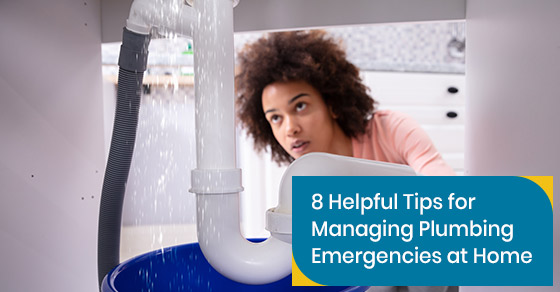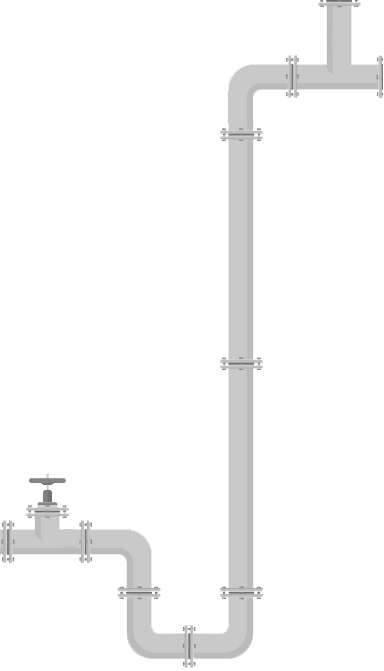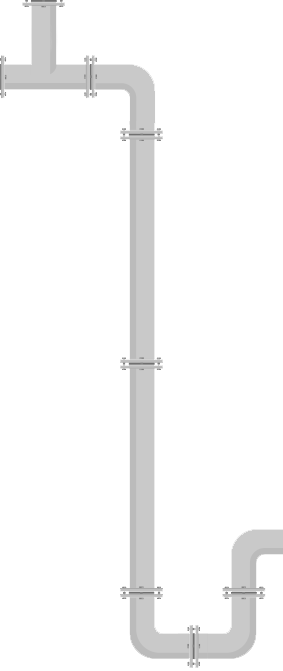8 Helpful Tips for Managing Plumbing Emergencies at Home
Posted by Jason Genah on 22-08-2020

In the chaos of a plumbing emergency, like a major leak, back-up, or indoor flood, it’s easy to lose track of basic plumbing know-how. This, coupled with a lack of regular plumbing maintenance, only makes the situation worse. On the flip side, staying calm and booking an emergency residential plumbing repair right away could prevent further damage.
What’s the first thing you should do in case of a back-up, clog, or burst pipe? Many homeowners often wouldn’t know, or worse, attempt a DIY residential plumbing repair to disastrous results. Knowing where the main tap is located to detecting leaks and burst pipes, it’s important to know what type of plumbing emergency you’re dealing with and prevent it from worsening before a plumber gets there.
1. Locate the main water valve
In any plumbing emergency, the first thing to do is shut off the water supply. A residential plumbing repair starts with isolating the problem and preventing it from worsening, such as when a pipe bursts and the basement is quickly flooding. Ask your plumber where the water mains are and how to shut off the water supply so that you can get any plumbing emergency in control in time for a fast repair.
2. Identify leaking joints and fixtures
Not sure if there’s a leak? To locate them, try shutting off the water at the main and see which tap is still dripping. Alternatively, increasing hydro bills are also a good indicator of a leaking pipe joint. Call your plumber right away to book an inspection and repair, and consider regular maintenance for future prevention.
Every minute counts in a plumbing emergency, so try to stop small leaks that are easy to identify. Keep a plumber’s tape handy to secure the leaky fixture or stuff rags and towels around; place a drip bucket underneath leaking pipes that are above ground. These temporary fixes can help prevent further damage, like flooding, and speed up the residential plumbing repair process as the plumber can address them right away.
3. Manage a burst pipe
Similar to leaks, a burst, collapsed, or broken pipe requires shutting off the water supply right away to stop the flow of water flooding your home. Without cutting off the water supply, you risk the larger damage — and cost — to appliances, furniture, and even your home’s structural integrity. Depending on where the burst pipe is, you may be able to isolate the damage by turning off the pipe’s source valve while waiting for the emergency plumbing repair service.
4. Identify clogged drains
Blocked drains are some of the most common causes of residential plumbing repairs and result from years of flushing grease, fat, chemicals, and other waste items that don’t belong there. Call a plumber as soon as you notice slow drainage or even a foul smell. They can use a drain camera to locate the blockage without digging through your lawn or backyard and unclog the drains without using toxic chemicals.
From standing water in the sink or tub, to a toilet that won’t flush and requires a plunger to unclog, it’s important to watch what goes down the drain. Rather than attempting a DIY repair — like pouring boiling water and baking soda down the drain, or worse, toxic chemical cleaners — book a residential plumbing inspection and repair at the first sign of slow drainage.
5. Check the water heater
Plumbing emergencies aren’t limited to leaks, clogs, and back-ups — they can also occur in heating systems and result in electric or gas line issues without a fast and effective residential plumbing repair.
In the case of any emergency, make sure to turn off the water heater, as you would unplug other appliances to prevent fires and overheating. Turn off the heater after the main water valve is shut off to avoid overheating the unit, or worse, the risk of an explosion. If you use a gas heater, make sure that the gas line is shut off first.
6. Open the drains and spigots
Once you shut off the main water valve, it’s important to direct the remaining water in the pipes away from your home. This helps isolate leaks and minimize flooding, and in the process, keeps water away from furniture, appliances, electrical connections, and other potential damage areas.
To do this, turn on spigots outside your home, and give the garden hose a few squirts to clear out any remaining water. If there is a small clog, you can also try using the plunger to shift the blockage just enough to let water flow out of your home, but remember to avoid chemical cleaners, as these can corrode and degrade the pipes. Taking these steps relieves pressure on a damaged residential plumbing system and isolates the problem for a fast and smooth emergency repair.
7. Know that plumbers are trained to respond to various emergencies
A clogged drain, overflowing toilet, leak, and backed-up sewer all require fast and effective residential plumbing repair. A certified plumber is trained to locate and diagnose these common plumbing issues, replace broken fixtures, and restore normal water supply and wastewater drainage. But did you know that they’re also trained to respond to other related issues?
A plumber isn’t the first person that comes to mind when you suspect a gas leak or any other gas-related hazard. But it’s important to alert them in case of a leak and shut off the main water valve as you request an emergency plumbing inspection. This is a necessary safety precaution for securing appliances connected to the water supply — such as the water heater — and ensuring that it does not overheat or explode in the process.
Don’t Attempt a DIY Repair
The cardinal rule of any effective residential plumbing repair is to avoid DIY solutions. Many homeowners fancy themselves as novice plumbers and repair crews, and it can require a lot of effort to resist taking your wrench out of the toolbox and removing leaking or collapsed pipe joints. Without the right training, experience, and certification, you only risk further damaging the plumbing system — and dealing with a more expensive emergency repair.
The best thing you can do is to always remember where you saved your plumber’s number and call them for a residential plumbing repair. In the meantime, you can attempt a temporary fix to a highly visible leak, such as securing the joint or fixture with plumber’s tape or lay down rags and towels to absorb the moisture and prevent water from pooling and flooding.
Make sure only to attempt these temporary fixes when the damage is visible and within reach, and take extra care to avoid damaging nearby pipe connections and fixtures.
For more tips on managing a plumbing emergency in your home, call Drain King Plumbers at 1-833-983-5301, or contact us here.




